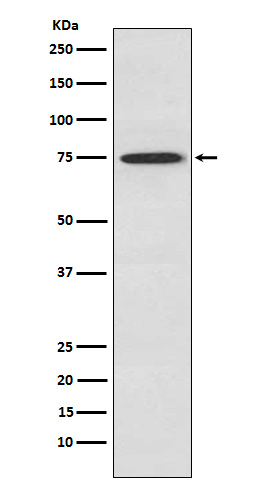
| WB | 1/500-1/1000 | Human,Mouse,Rat |
| IF | 咨询技术 | Human,Mouse,Rat |
| IHC | 咨询技术 | Human,Mouse,Rat |
| ICC | 技术咨询 | Human,Mouse,Rat |
| FCM | 咨询技术 | Human,Mouse,Rat |
| Elisa | 咨询技术 | Human,Mouse,Rat |
| Aliases | PRKCQ; PRKCT; Protein kinase C theta type; nPKC-theta |
| Entrez GeneID | 5588 |
| WB Predicted band size | Calculated MW: 82 kDa; Observed MW: 82 kDa |
| Host/Isotype | Rabbit IgG |
| Antibody Type | Primary antibody |
| Storage | Store at 4°C short term. Aliquot and store at -20°C long term. Avoid freeze/thaw cycles. |
| Species Reactivity | Human,Mouse,Rat |
| Immunogen | A synthesized peptide derived from human PKC theta |
| Formulation | Purified antibody in PBS with 0.05% sodium azide. |
+ +
以下是关于PKCθ抗体的3篇参考文献及其摘要概括:
---
1. **文献名称**: *"Protein kinase C-θ: a new essential regulator of TCR signaling"*
**作者**: Altman A., Isakov N.
**摘要**: 该研究揭示了PKCθ在T细胞受体(TCR)信号传导中的关键作用,通过特异性抗体检测发现PKCθ选择性定位于免疫突触,并参与NF-κB和AP-1通路的激活,为T细胞活化机制提供了新见解。
2. **文献名称**: *"PKCθ regulates T cell motility via ezrin-radixin-moesin localization during immune responses"*
**作者**: Kang J. et al.
**摘要**: 研究利用PKCθ抗体进行免疫荧光和Western blot分析,发现PKCθ通过调控细胞骨架蛋白ERM的磷酸化,影响T细胞迁移和免疫突触稳定性,揭示了其在免疫应答中的动态调控机制。
3. **文献名称**: *"Targeting PKCθ in autoimmune diseases: Insights from antibody-based studies"*
**作者**: Baier G., Watanabe T.
**摘要**: 文章通过PKCθ抗体阻断实验和小鼠模型,证明抑制PKCθ可减轻类风湿性关节炎和炎症性肠病症状,提示其作为自身免疫疾病治疗靶点的潜力,并强调抗体在功能研究中的工具价值。
---
以上文献涵盖了PKCθ抗体的实验应用(如定位、功能阻断)及其在基础机制和疾病治疗中的研究。如需扩展,可进一步检索近年综述或特定技术(如单克隆抗体制备)相关论文。
Protein kinase C theta (PKCθ) is a member of the novel PKC subfamily, primarily expressed in T lymphocytes, skeletal muscle, and platelets. It plays a pivotal role in immune synapse formation and T-cell activation, serving as a critical mediator of intracellular signaling pathways downstream of the T-cell receptor (TCR) and CD28 co-stimulation. Unlike other PKC isoforms, PKCθ selectively translocates to the immunological synapse upon TCR engagement, where it activates transcription factors such as NF-κB and AP-1. driving cytokine production and T-cell survival. Its unique localization and function make it a key regulator of adaptive immunity, particularly in Th2 differentiation and inflammatory responses.
PKCθ-specific antibodies are essential tools for studying its expression, activation, and subcellular distribution. These antibodies are widely used in techniques like Western blotting, immunohistochemistry, and flow cytometry to investigate PKCθ's role in autoimmune diseases (e.g., rheumatoid arthritis, lupus), allergic disorders, and cancer immunotherapy. Researchers also utilize PKCθ inhibitors or knockout models to explore its therapeutic potential. Notably, PKCθ-deficient mice exhibit impaired T-cell activation, underscoring its non-redundant functions. However, its dual role in pro-inflammatory and regulatory T-cell pathways complicates therapeutic targeting. Validated PKCθ antibodies help dissect these mechanisms, aiding drug development and biomarker discovery in immune-related pathologies.
×